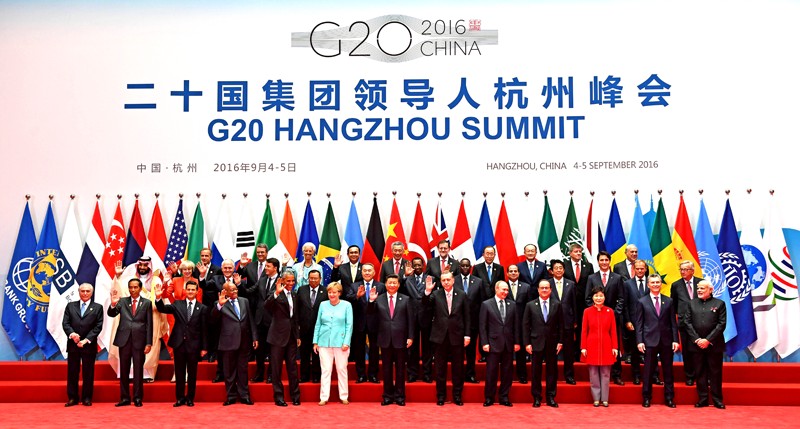Popular Reads
Top Results
Can't find what you're looking for?
View all search resultsPopular Reads
Top Results
Can't find what you're looking for?
View all search resultsIndonesia leans toward China
Change text size
Gift Premium Articles
to Anyone
 Say cheese!: Chinese President Xi Jinping (seventh from left in front row) poses with G20 leaders, including Indonesian President Joko “Jokowi” Widodo (second left, front row), and other invited guests for a group photo in Hangzhou, China, on Sunday. World Leaders are gathering in Hangzhou for the 11th G20 leaders summit from Sunday to Monday. (AFP/Greg Baker)
Say cheese!: Chinese President Xi Jinping (seventh from left in front row) poses with G20 leaders, including Indonesian President Joko “Jokowi” Widodo (second left, front row), and other invited guests for a group photo in Hangzhou, China, on Sunday. World Leaders are gathering in Hangzhou for the 11th G20 leaders summit from Sunday to Monday. (AFP/Greg Baker)

Ten million Chinese tourists are expected to visit Indonesia and Chinese billionaire Jack Ma has been invited to give advice to Indonesia’s e-commerce committee — both signs that Indonesia is looking to cash in on its relationship with the world’s second-largest economy.
The Indonesian government has asked Jack Ma, the chairman of Chinese online marketplace Alibaba Group Holding Ltd., to become an advisor to its steering e-commerce committee. The committee is designed to develop the booming e-commerce sector and will consist of 10 ministers.
“This [proposal] is to make Indonesia’s position in the international marketplace more prominent,” Communications and Information Minister Rudiantara said after President Joko “Jokowi” Widodo’s visit to Alibaba’s office in Hangzhou last weekend.
Jokowi was in China to attend the two-day G20 Summit that ended on Monday. Before the summit, he took the time to conduct a bilateral meeting with China’s President Xi Jinping — their fifth meeting in the past two years — and promote Indonesia’s tourism, e-commerce and electricity sectors in a business forum attended by 1,000 Chinese business players.
A stronger Chinese presence and influence in Indonesia is emerging after the recent realization of a string of business deals. Some notable projects include Indonesia’s first ever high-speed railway, secured in a US$5.1 billion deal between a China-Indonesia consortium and a multi-billion financing agreement between the China Development Bank and Indonesian state banks.
To keep up the strong investment momentum, Indonesia’s Investment Coordinating Board (BKPM) earlier this year launched the “China Desk”, which is essentially a help desk to answer all investment-related questions from Chinese investors, after noting that just 7 percent of China’s investment commitments were realized from 2005 to 2014.
In the electricity sector, Chinese firms are expected to participate in the government’s ambitious 35,000 megawatt (MW) program until 2019, while in the tourism sector, it is hoped that Chinese investors will visit the nation’s emerging tourist destinations such as Raja Ampat, Mandalika and Labuan Bajo.
“Especially in the tourist sector, our efforts are related to the development of 10 tourist destinations, in line with President Joko Widodo’s invitation for Chinese tourists to visit not only Bali, but also other destinations,” BKPM chairman Thomas Lembong said in a statement.
Jokowi signed an agreement with Xi Jinping last year to attract 10 million tourists from China, half of his 20 million target for 2019. To achieve the target, the government has liberalized visa requirements for visitors from most countries in the world.
“I told Alibaba to strengthen its promotion of Indonesia so that I can really get 10 million tourists from China,” Jokowi said after the visit to Alibaba’s headquarters. The Chinese are among Indonesia’s top foreign visitors. Chinese visitors to Indonesia are expected to climb to 1.7 million this year out of a target of 12 million foreign tourists.
Alibaba has a presence in Indonesia through the Southeast Asia e-commerce platform Lazada, into which Alibaba invested $1 billion recently. Its subsidiary, Tmall Global, also hosts the Indonesian platform Inamall, enabling local products to be accessed in the Chinese marketplace.
China, which is Indonesia’s top trading partner, is seen as a friendly counterpart with strong innovation in its digital economy, especially in the e-commerce and financial technology (fintech) sectors, said Indonesia Chamber of Commerce and Industry (Kadin) vice chairwoman for international relations Shinta Widjaja Kamdani.
“Indonesian businesspeople hope for financing and cooperation in technology with China to develop Indonesia’s e-commerce sector,” said Shinta, who joined the G20 Summit.
Indonesia’s e-commerce industry is booming alongside its emerging middle class. It is predicted that 141 million people will enter into middle class status by 2020, from 88 million in 2014, according to the Boston Consulting Group.
E-commerce transactions might possibly reach $24.6 billion in value this year, three times higher than in 2013, local e-commerce association (idEA) data showed.
______________________________
To receive comprehensive and earlier access to The Jakarta Post print edition, please subscribe to our epaper through iOS' iTunes, Android's Google Play, Blackberry World or Microsoft's Windows Store. Subscription includes free daily editions of The Nation, The Star Malaysia, the Philippine Daily Inquirer and Asia News.
For print subscription, please contact our call center at (+6221) 5360014 or subscription@thejakartapost.com









